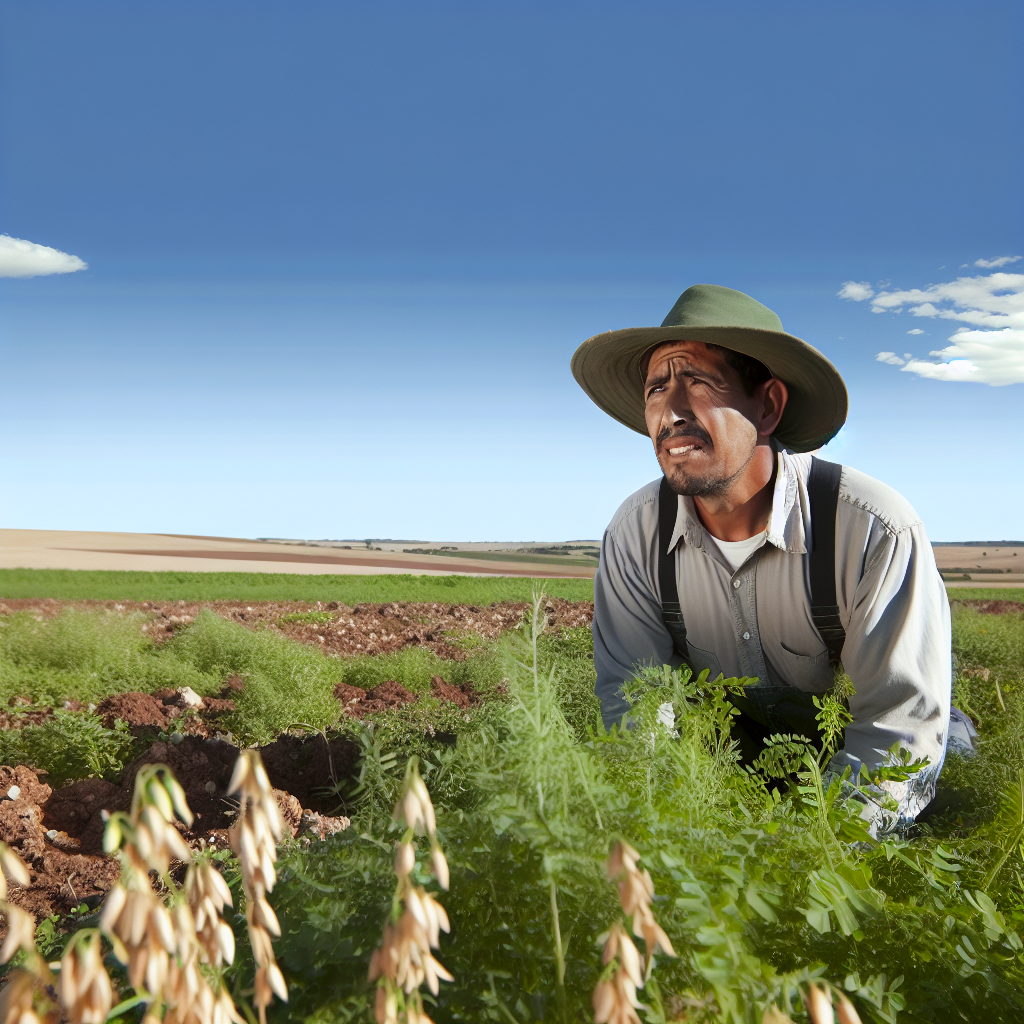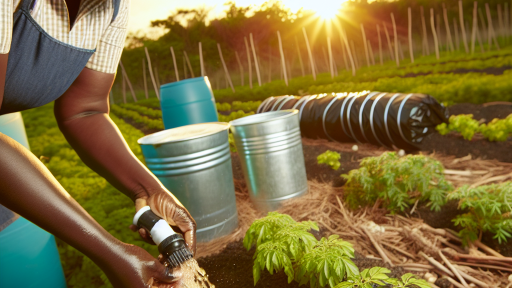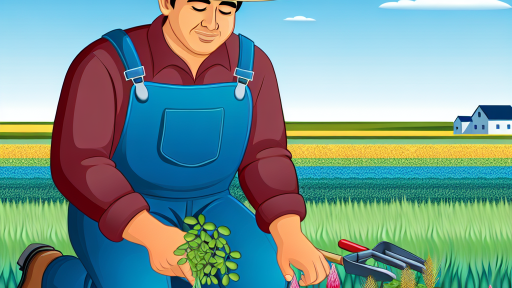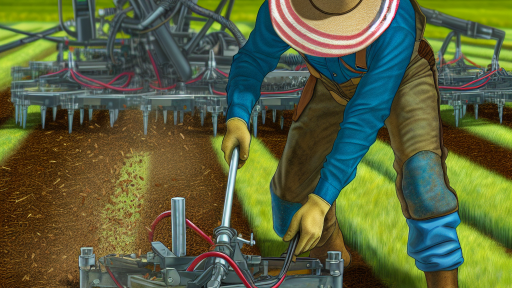Introduction to Cover Crops
Cover crops play a crucial role in sustainable agriculture.
They protect and improve soil health throughout the year.
Farmers can choose from various types of cover crops.
Common options include clover, rye, and vetch.
These crops grow during the off-season when main crops are not planted.
They offer numerous benefits for both the environment and farm economy.
Soy Erosion Prevention
One primary benefit is the prevention of soil erosion.
Cover crops naturally stabilize the soil with their root systems.
They reduce runoff, protecting topsoil from being washed away.
This helps maintain fertility and prevents nutrient loss.
Enhancing Soil Health
Cover crops significantly enhance soil health.
They improve organic matter content, benefiting soil structure.
Additionally, they promote microbial activity, which aids plant growth.
These crops can also help in nutrient cycling.
For instance, legumes fix nitrogen in the soil.
Transform Your Agribusiness
Unlock your farm's potential with expert advice tailored to your needs. Get actionable steps that drive real results.
Get StartedThis provides an essential nutrient for subsequent crops.
Weed Suppression
Another advantage is weed suppression.
Cover crops outcompete weeds for sunlight and nutrients.
This reduces the need for herbicides, cutting costs for farmers.
By minimizing weed populations, cover crops contribute to sustainable practices.
Water Management
Cover crops also play a role in water management.
They improve water infiltration and retention in the soil.
This is especially important during heavy rainfall or droughts.
Improved water management leads to healthier crops and better yields.
Economic Benefits
Planting cover crops can lead to direct economic advantages.
Farmers often experience reduced input costs for fertilizers and pesticides.
Moreover, cover crops can enhance crop yield quality and quantity.
In the long term, these benefits contribute to farm profitability.
Investing in cover crops is a wise choice for sustainable agriculture.
Economic Benefits of Cover Crops
Cost Savings on Fertilizers and Pesticides
Farmers can significantly reduce their fertilizer costs by using cover crops.
Cover crops naturally enhance soil fertility and nutrient retention.
This practice decreases the need for synthetic fertilizers.
Consequently, farmers can direct funds towards other important areas.
Moreover, cover crops can suppress weed growth.
This leads to a reduced dependency on herbicides.
Farmers can save money on chemical weed control products as a result.
Using cover crops also helps to break pest cycles in the soil.
This minimizes the need for pesticide applications during the growing season.
Additionally, healthier soils often yield better crop outcomes.
Showcase Your Farming Business
Publish your professional farming services profile on our blog for a one-time fee of $200 and reach a dedicated audience of farmers and agribusiness owners.
Publish Your ProfileThis results in increased profitability for farmers in the long run.
Beyond immediate savings, cover crops improve overall farm sustainability.
This investment leads to healthier ecosystems and long-term agricultural viability.
By adopting this method, farmers embrace a proactive approach to farming.
Ultimately, the financial and environmental returns are significant.
Improvement of Soil Health and Structure Leading to Increased Productivity
Enhancing Soil Fertility
Cover crops significantly improve soil fertility.
They add organic matter to the soil.
This organic matter enhances nutrient availability.
As a result, crops can absorb nutrients more efficiently.
Farmers benefit from reduced dependence on chemical fertilizers.
Preventing Soil Erosion
Cover crops play a vital role in preventing soil erosion.
Their root systems bind the soil together.
This binding action protects against wind and water erosion.
Consequently, farmers maintain healthier fields over time.
Improving Soil Structure
Growing cover crops enhances soil structure.
The diverse root systems create channels for air and water.
These channels improve water infiltration and drainage.
Additionally, they promote microbial activity in the soil.
Healthy microbial activity further enriches soil health.
Boosting Crop Yields
Enhanced soil health directly correlates with increased crop yields.
Farmers often report higher productivity after using cover crops.
This increase can lead to better profits in the long run.
Moreover, healthier crops are more resilient against pests and diseases.
Cost-Effective Solutions
Using cover crops is a cost-effective farming strategy.
They reduce the need for expensive soil amendments.
Farmers can save money on fertilizers and pest controls.
This savings further ensures financial sustainability.
Investing in cover crops yields long-term economic benefits.
Gain More Insights: Seasonal Trends In Pest And Disease Forecasting
Reduction of Erosion and Its Financial Implications for Farming Practices
Understanding Erosion in Agriculture
Erosion significantly impacts agricultural productivity.
It leads to the loss of valuable topsoil.
This loss directly reduces crop yields over time.
Consequently, farmers face increased costs for fertilizers and amendments.
Role of Cover Crops in Erosion Control
Cover crops effectively reduce soil erosion.
They improve soil structure and promote root development.
Additionally, cover crops enhance water retention in the soil.
These factors collectively curb the impact of rainfall and wind on soil.
Financial Benefits of Erosion Control
Reducing erosion can lead to significant financial savings.
Farmers can lower their spending on soil amendments.
This contributes to improved profit margins in the long run.
Showcase Your Farming Business
Publish your professional farming services profile on our blog for a one-time fee of $200 and reach a dedicated audience of farmers and agribusiness owners.
Publish Your ProfileMoreover, healthy soil enhances crop quality, leading to better market prices.
Long-term Sustainability and Profitability
Implementing cover crops fosters long-term soil health.
Healthy soils provide numerous economic advantages.
Farmers can expect consistent yields in varying climatic conditions.
Ultimately, this practice supports sustainable farming operations.
Delve into the Subject: Integrating Nutrient Management on Your Farm
Improvement of Water Retention and Reduction in Irrigation Costs
Enhancing Soil Structure
Cover crops effectively enhance soil structure over time.
They introduce organic matter to the soil, improving its composition.
This improved structure allows soil to retain water more effectively.
As a result, farmers experience lower irrigation requirements.
Reducing Soil Erosion
Cover crops significantly reduce soil erosion during rainfall events.
Their root systems stabilize the soil and prevent runoff.
This erosion reduction contributes to improved water retention in the soil.
Consequently, farms maintain better moisture levels during dry periods.
Lowering Irrigation Costs
With better water retention, farmers can reduce reliance on irrigation.
This reduction directly translates into decreased irrigation costs.
As a result, farmers can allocate resources to other important areas.
Moreover, less frequent irrigation lessens the energy costs associated with water pumping.
Improving Crop Yield
Cover crops contribute to healthier soil ecosystems.
Healthy soil systems can promote increased crop yields.
Higher yields can offset any initial investment in cover crop seeds.
This increase in productivity further aids in overall farm profitability.
Economic Benefits of Cover Crops
Incorporating cover crops offers multiple economic advantages.
They enhance water retention, reducing irrigation reliance and costs.
By improving soil health, farmers can achieve better crop yields.
Cover crops serve as a financially beneficial practice for sustainable farming.
You Might Also Like: Cover Cropping Techniques for Organic Farming

Enhanced Biodiversity and Its Impact on Farm Resilience and Profitability
Introduction to Cover Crops
Cover crops serve multiple roles on farms.
They enhance soil health and fertility.
Furthermore, they promote biodiversity within farming ecosystems.
Ecological Benefits of Increased Biodiversity
Enhanced biodiversity leads to improved soil structure.
Diverse root systems prevent soil erosion effectively.
Additionally, these crops support beneficial insects and pollinators.
This biological diversity contributes to pest control naturally.
Financial Benefits of Biodiverse Farming
Farmers experience reduced input costs as biodiversity increases.
Healthy ecosystems reduce the need for chemical fertilizers.
Consequently, profits rise when input expenses decline.
Moreover, diverse crops can improve yields over time.
Resilience Against Climate Variability
Diverse cover crops help farms adapt to changing weather patterns.
For instance, they improve water retention in soils.
Showcase Your Farming Business
Publish your professional farming services profile on our blog for a one-time fee of $200 and reach a dedicated audience of farmers and agribusiness owners.
Publish Your ProfileThis feature becomes crucial during drought conditions.
Additionally, varied crops reduce crop failure risk during unpredictable weather.
Long-Term Sustainability and Profitability
Ultimately, increased biodiversity leads to long-term farm sustainability.
Farmers who adopt cover crops witness increased resilience.
This positive trend leads to consistent profitability over years.
As a result, cover crops emerge as a wise investment for modern farming.
Learn More: Natural Pest Control Methods for Organic Crops
Market Opportunities for Sustainably Grown Produce Using Cover Crops
Expanding Consumer Demand
Consumers increasingly prioritize sustainably grown produce.
This shift creates a valuable market for growers using cover crops.
Sustainable farming practices appeal to conscious consumers.
In turn, this demand can lead to premium pricing.
Participation in Specialty Markets
Cover crops can enable farmers to enter specialty markets.
These markets include organic, non-GMO, and locally sourced segments.
Farmers can differentiate their products based on sustainability.
This differentiation may enhance brand loyalty among consumers.
Government and Certification Programs
Various government programs incentivize sustainable practices.
These programs often provide financial support for cover crop implementation.
Additionally, certification programs validate sustainable farming methods.
Certification can improve market access and consumer trust.
Collaborative Efforts with Local Businesses
Farmers can establish partnerships with local businesses.
These partnerships may focus on promoting sustainably grown products.
Restaurants and grocery stores often seek local, sustainable options.
Such collaborations can enhance community engagement and support.
Utilizing Technology for Marketing
Advancements in technology help farmers market sustainably grown produce.
Social media platforms allow farmers to reach a wider audience.
Farmers can share their practices and engage with customers directly.
This transparency fosters consumer trust and encourages sales.
Long-term Economic Benefits
Using cover crops can lead to improved soil health over time.
Healthy soil increases crop yields, benefiting farmers economically.
Moreover, long-term benefits include reduced dependency on chemical inputs.
This shift may lower operational costs for farmers over time.
Case Studies Showcasing the Economic Impact of Cover Crops
Increasing Crop Yields
Farmers have observed significant improvements in crop yields after using cover crops.
A study in Ohio revealed a 15% increase in corn yields.
This resulted from enhanced soil structure and nutrient availability.
Likewise, soybeans showed a similar yield increase in neighboring fields.
These results highlight how cover crops can enhance farm output effectively.
Cost Reduction in Inputs
Utilizing cover crops can lead to reduced input costs for farmers.
A case study in Iowa demonstrated a decrease in fertilizer expenses by 20%.
This reduction occurred due to improved nutrient cycling in the soil.
Moreover, weed management costs dropped significantly.
Showcase Your Farming Business
Publish your professional farming services profile on our blog for a one-time fee of $200 and reach a dedicated audience of farmers and agribusiness owners.
Publish Your ProfileFarmers reported enhanced competition against weeds thanks to cover crops.
Improved Soil Health
The economic benefits of cover crops also include enhanced soil health.
In California, farmers noted increased organic matter levels in their soils.
This resulted in better water retention and reduced irrigation costs.
The improved soil structure ensured higher resilience against erosion.
As a result, long-term savings became evident for these farms.
Long-Term Sustainability
Investing in cover crops promotes long-term sustainability.
A five-year study in Nebraska highlighted sustainable practices that attract grants.
Many farmers benefited from government incentives for implementing these practices.
This created additional revenue streams for their operations.
Such initiatives encourage practices that are both economically viable and environmentally friendly.
Summary of Economic Benefits
Case studies demonstrate the economic advantages of cover crops.
Farmers experience increased yields, reduced costs, and enhanced soil health.
Additionally, long-term sustainability offers further economic incentives.
These findings encourage more farmers to adopt cover crops in their operations.
Additional Resources
Cover crops use in Midwestern US agriculture: perceived benefits …
Do Cover Crops Help Farmers Save Costs? – National Sustainable …




